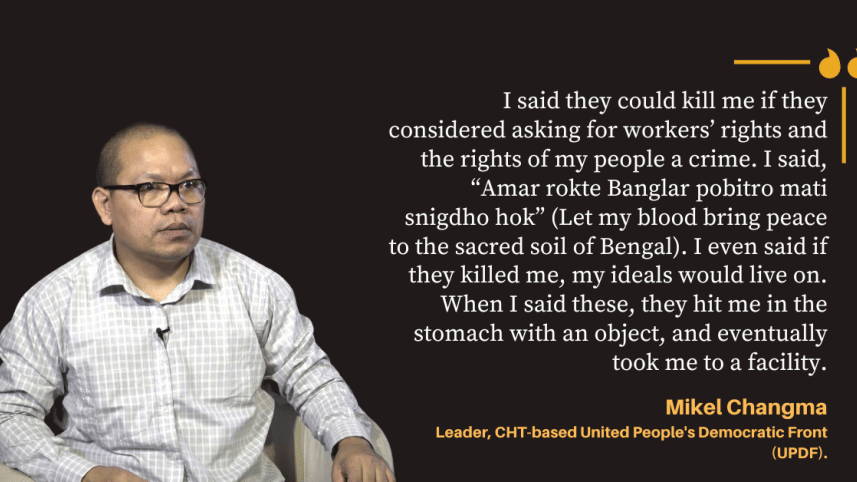'Let my blood bring peace to the sacred soil of Bengal'

I knew I was abducted on the basis of a politically motivated case. Those who abducted me knew my name and were in plainclothes. I was told that I was against the treaty (Chittagong Hill Tracts Peace Accord, 1997). They claimed it was a crime to oppose it. They said, "It means you are against the state. The government runs the state, and the government is the state."
I said they could kill me if they considered asking for workers' rights and the rights of my people a crime. I said, "Amar rokte Banglar pobitro mati snigdho hok" (Let my blood bring peace to the sacred soil of Bengal). I even said if they killed me, my ideals would live on. When I said these, they hit me in the stomach with an object, and eventually took me to a facility.
The facilities are constructed so that a sliver of light enters through an angle only in a few rooms so you can see nothing. No sound from outside can be heard. Towards the end, I fell very ill. In the beginning, I lost a significant amount of weight as I was unable to eat. I was handcuffed, blindfolded tightly, and not allowed to sleep during my time there. I suffered in this manner for a year. Medical examinations had to be conducted on me because I had fallen severely ill. My sodium level and blood pressure had dropped drastically.
One day, I was fastened onto a chair that was capable of rotating at a high speed. I was asked, "Where are your weapons?"
In this way, five years passed there. No information reached me during that time, and speaking to others was not allowed. I did hear the sound of other people talking and felt the presence of other inmates, but I never got to know what happened to them.
On the day of my release, I was asked if I had any personal belongings. At that point, I did not know I was going to be freed. I thought I was going to be killed. I was being taken somewhere in a car while another car was following us and I saw weapons.
I was in the car for several hours, when suddenly a left turn was taken. The man to my right told me not to scream or make a fuss. He asked if I knew my family's number. Then he said, "We're going to release you. Wherever we drop you, you will stay there, for 30 minutes. If you get up before that time, we'll shoot you. Once 30 minutes pass, you will untie yourself, and you will run."
I said nothing. When I opened my blindfold, I saw the light of the world for the first time in years. I saw in a newspaper that the nation was awaiting a new government; I learnt that Sheikh Hasina's government had fallen.
My family was in immense pain. They believed I had passed away, and my funeral was held. I learnt my father who was alive at the time of my capture, was no more.
If it had not been for the student's uprising, the heaviness of the pain for many in a similar situation would not have been relieved. Sheikh Hasina and her accomplices committed heinous acts to create an atmosphere of immense fear. She along with every person who assisted her should be tried. I want them to be punished lawfully so that such heinous acts and such horrifying breaches of human rights, never occur.
Mikel Changma is leader, CHT-based United People's Democratic Front (UPDF).
This is an abridged excerpt from an interview taken for The Daily Star.
Follow The Daily Star Opinion on Facebook for the latest opinions, commentaries and analyses by experts and professionals. To contribute your article or letter to The Daily Star Opinion, see our guidelines for submission.



 For all latest news, follow The Daily Star's Google News channel.
For all latest news, follow The Daily Star's Google News channel. 

Comments